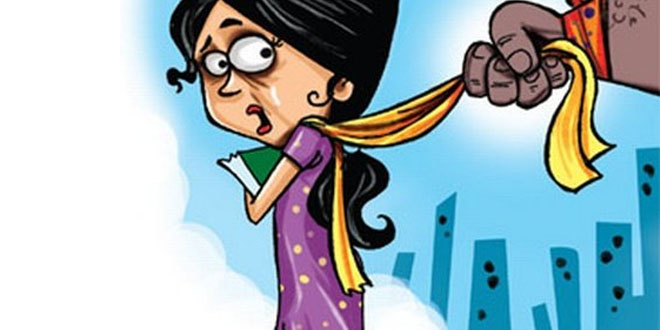
Pakistanis need to stop downplaying eve-teasing
“Beta, don’t go out today, it is chaand raat. The bazaar will be very crowded.”
Yes, of course, I thought; why would I? It’s not like I have a heart or I have to put mehendi on, or I have any last minute shopping to do. So why shouldn’t I just stay home while the male population takes its turn to wield its patriarchal power?
Very few women would say they haven’t ever heard a “smooch” while they walked down the street or that no one hooted at them while they crossed the road or that they didn’t see groups of men scrutinizing every part of their body or they didn’t feel the “casual” brushing pass or the “harmless” poking and groping.
While the rest of the world recognizes such behaviour as sexual harassment, in our ‘virtuous’ part of the world, it is euphemistically referred to as ‘eve-teasing’. This term stands for public or sexual harassment on the street that encompasses any act or words by which a man makes a woman feel uncomfortable and anxious. They differentiate the two based on the intensity of the act.
While eve teasing is considered milder, less personal, has no history and occurs at random, sexual harassment is more intense, usually involves history and personal relationship between the abuser and the victim. The major difference, however, is that eve teasing is much more difficult a crime to prove and is taken as a recreational activity by boys.
As much as Pakistani ‘bhais’ would like to protect their ever-so-vulnerable ‘behens’, they are the reason Pakistani ‘behens’ rather stay home than go to college in a bus. We, as a community, trust our courageous Pakistani bhais to be too shareef to be in any way liable of inappropriate sexual behavior; however, Pakistani behens know the real truth.
According to a Bengali non-profit organization, the Hunger Project, eve-teasing is harmful to women in aspects beyond temporary mental stress. It leads to low self-esteem, and it has negative effects on human and social development. Tormented females tend to drop out of school, leading to earlier marriage which then affects maternal nutrition and health adversely. This further leads to low birth weight of new borns of these young mothers.
Eve-teased females have low self-esteem, may suffer from depression as they feel weak and frustrated. In India and Bangladesh, it has forced a lot of women to commit suicide. These findings were supported by the telecommunications company in Pakistan when it asked a research firm to explore the common problems faced by Pakistani youth. The company revealed that eve-teasing was the most grave and widespread problem faced by young women in Pakistan and that it obstructed their chances of development by limiting them to their homes. It was then addressed in ad campaigns.
The major obstacle in solving this problem in Pakistan is that the gravity of the situation is downplayed by the term “eve-teasing”. It refers to the women as eves, like they are temptresses aiming to incite blameless men into inappropriate behavior. Victim blaming leads to changing attire however despite modest attire there has been no decline in such cases. “Any woman who reports harassment always mentions what she was wearing,” says Ambreen Ajaib, who is a psychologist at the NGO Bedari.
However, we see a ray of hope for curbing this issue in Pakistan in the form of ‘Protection against Harassment at the Workplace Act 2009’. Unfortunately, till date, there has been no proper study conducted on this topic which makes it impossible to even estimate the number of harassment cases. This is mostly because majority of the females believe that the fault lies in them and the way they dress.
It is time that we start talking about this social corruption more openly and find solutions to effectively curb it.

